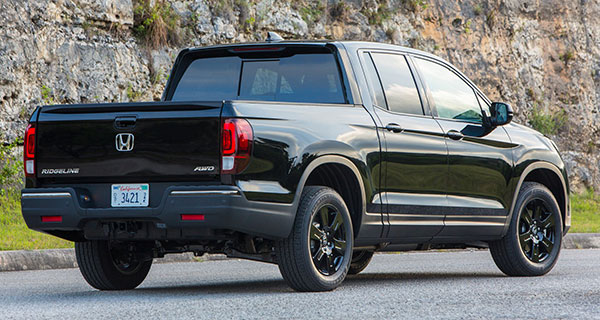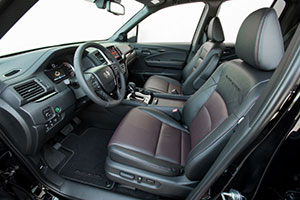
The second-generation Ridgeline has been normalized and made much more traditional in appearance. Honda kept the driveability and usability in the 2019 version, but styled it more in line with what we associate with a contemporary North American pickup truck. Only better.
 When Honda introduced its Ridgeline pickup in 2006, it was well received except for one thing: it looked funny.
When Honda introduced its Ridgeline pickup in 2006, it was well received except for one thing: it looked funny.
It didn’t really resemble a traditional North American pickup, with its high rear deck sides and odd cargo layout. Some said it had more than a passing resemblance to the Chevrolet Avalanche, which wasn’t necessarily a good thing.
But it had four doors, could carry a full-size ATV or cruiser-sized motorcycle, and what it lacked in appearance it more than made up for in driveability and refinement.
It was an instant success for Honda and owners swear by it.
From the start, Honda made it clear that the Ridgeline wasn’t meant to go toe to toe with the likes of the Dodge Ram, Ford F-150 or Chevrolet Silverado. This was a new truck, meant to appeal to weekend warriors and established Honda enthusiasts.
Honda stopped production in 2014, leaving Ridgeline owners wondering what the company could do to top the first generation. In 2017, they found out.
The second-generation Ridgeline has been made much more traditional in appearance. Honda kept the driveability and usability, but styled it more in line with what we associate with a contemporary North American pickup. Only better. This is an incredibly clean-looking truck, head and shoulders above what came before it.
Power for the 2019 Ridgeline is provided by a 3.5-litre V6 that develops some 280 horsepower. Honda has been using this engine in one form or another for years. It’s found in the Odyssey, the last generation of the Ridgeline and various Acura products. You’ll look long and hard to find a smoother, more tractable power plant. It’s mated to a six-speed automatic transmission with full-time all-wheel-drive. This is smoothness and drivetrain civility defined.

The 2019 Honda Ridgeline is a pleasure to drive. Sliding behind the wheel – often a problem with full-size pickup trucks – is simple. Interior controls are reasonably straightforward and the centre console/storage bin has room for all your bits and pieces.
That said, the Ridgeline isn’t primarily designed for serious off-road slogging. It can handle the rough stuff to a point, but Honda didn’t intend it to be a down-and-dirty bush beast. This is for weekend fun-seekers and comes with a 2,268-kg towing capacity.
The Ridgeline is a pleasure to drive. Sliding behind the wheel – often a problem with full-size pickup trucks – is simple. Interior controls are reasonably straightforward – although I didn’t get along with the stereo system – and the centre console/storage bin has room for all your bits and pieces.
I would be remiss if I didn’t also mention the raft of driver-assist technology: adaptive cruise control, lane-keeping technology, road-departure mitigation, collision-avoidance mitigation, hill start assist and, depending on the model, rear cross-traffic monitor, blind spot assist and automatic high beam headlamps.
Most of these I can get along with and the Ridgeline is much less molly-coddling than the Honda Insight or Acura RDX. But I still think Honda should make all these features optional and offer a down-to-earth, manly pickup truck with just the basics. I don’t need a vehicle to keep me in line and would argue that a lot of this stuff results in less attentive, lazy drivers who become too accustomed to letting the vehicle do all the work.
Honda/Acura has adopted a touch-sensitive radio screen that does away with knobs and buttons. Something as simple as changing the volume involves grappling with a monitor-located slide control. It’s a good idea in theory but with the vehicle bumping around, you often miss the mark and end up fighting with a system that won’t do what it’s told and redirects you to navigation or other functions.
Yes, the Ridgeline has a steering-wheel-mounted volume button, but why not just have an old-fashioned volume knob for the radio?
Still, the Ridgeline ticks all the boxes when it comes to utility and driveability. It’s civilized, practical (love the fold-up back seat) and, as far as it goes, rugged. Score another one for Honda.
2019 Honda Ridgeline
Engine: 3.5 litre V6
Transmission: Six-speed automatic
Drive: All-wheel drive
Horsepower: 280 horsepower at 6,000 rpm
Torque: 262 foot pounds at 4,700 rpm
Base price: $40,990
Fuel economy: 12.8 litres/100 km city and 9.5 highway with regular gas
Some alternatives: Toyota Tacoma, Ford F-150, Chevrolet Colorado, GMC Canyon, Nissan Frontier, Dodge Ram.
Ted Laturnus writes for Troy Media’s Driver Seat Associate website. An automotive journalist since 1976, he has been named Canadian Automotive Journalist of the Year twice and is past-president of the Automotive Journalists Association of Canada (AJAC).
The views, opinions and positions expressed by columnists and contributors are the author’s alone. They do not inherently or expressly reflect the views, opinions and/or positions of our publication.

